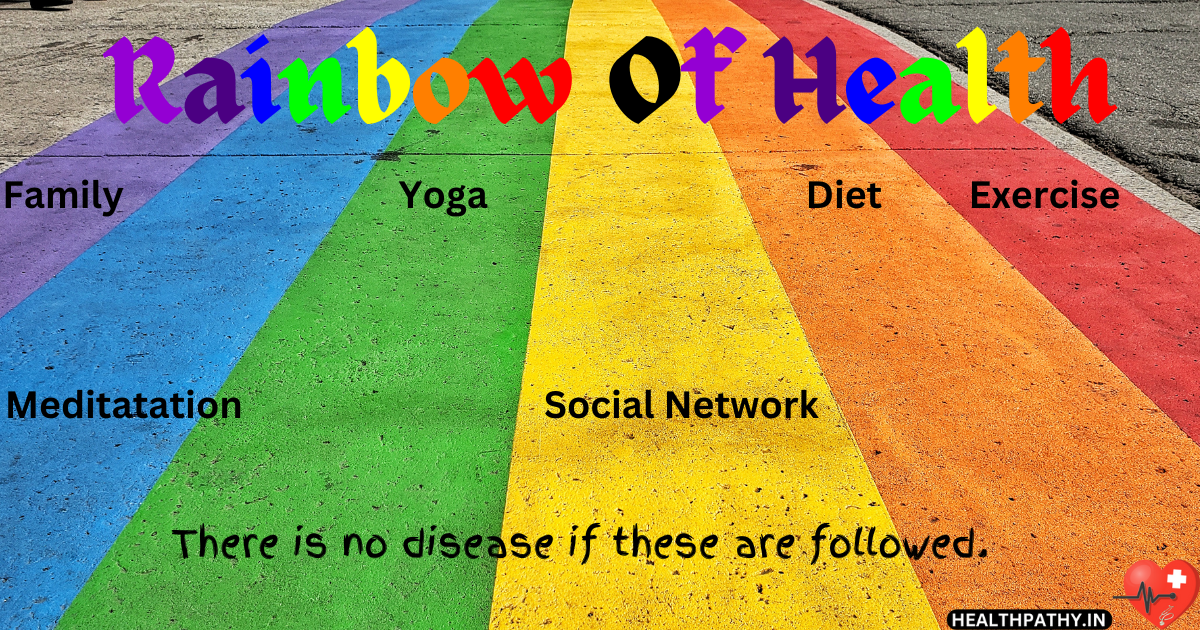
EXPLORE INTO THE WORLD OF HEALTH, FITNESS & HOMEOPATHY






Balanced Nutrition: Consuming a well-rounded, balanced diet that includes a variety of fruits, vegetables, whole grains, lean proteins, & healthy fats is essential for providing the body with the necessary nutrients for optimal functioning & overall health.
Regular Physical Activity: Engaging in regular exercise or physical activity promotes cardiovascular health, strengthens muscles & bones, improves mental well-being, & helps maintain a healthy weight. Finding activities you enjoy & making them a part of your routine is key to living a healthy lifestyle.
Adequate Sleep: Prioritizing sufficient & quality sleep is crucial for physical & mental rejuvenation. Aim for 7-9 hours of sleep per night to support optimal brain function, boost immune system resilience, & promote overall well-being.
Stress Management: Chronic stress can have detrimental effects on health. Implementing stress-management techniques such as mindfulness, meditation, deep breathing exercises, & engaging in hobbies or activities that bring joy can help reduce stress levels & promote a healthy mind-body balance.
Social Connections: Nurturing meaningful relationships & maintaining a strong social support network is vital for mental & emotional well-being. Cultivating connections with family, friends, & communities helps reduce feelings of isolation, boosts mood, & provides a sense of belonging and support.










FAT 2 FIT
Obesity is when a person has too much body fat, which can harm their health. It happens when a person consumes more calories than they burn through activities. This can lead to serious issues like heart problems, diabetes, and joint pain. It’s important to eat balanced meals and stay active to maintain a healthy weight.
Causes: Obesity can result from various factors, including poor diet choices, lack of physical activity, genetics, and hormonal imbalances. Emotional factors and lifestyle also play a role.
Health Risks: Being obese can increase the risk of serious health issues like high blood pressure, type 2 diabetes, sleep apnea, and heart disease. It can also affect one’s self-esteem and mental health.
Prevention: Maintaining a healthy weight involves making smart food choices, staying active, and getting enough sleep. Seeking support from healthcare professionals, nutritionists, and fitness experts can be beneficial for managing and preventing obesity.
Homeopathy offers individualized approaches to address obesity by considering the person’s unique physical and emotional characteristics. Homeopathic remedies are chosen based on the principle of “like cures like,” where substances that could produce obesity-like symptoms in a healthy person are used in highly diluted forms to stimulate the body’s self-regulating mechanisms. Homeopathic treatment for obesity aims to:
- Balance Hormones: Remedies can target hormonal imbalances that contribute to weight gain, such as thyroid issues or polycystic ovary syndrome (PCOS).
- Reduce Cravings: Homeopathy may help curb excessive appetite and cravings for certain foods, making it easier to control calorie intake.
- Boost Metabolism: Some remedies are believed to enhance metabolic processes, aiding in weight loss.
- Improve Digestion: Addressing digestive problems can lead to better nutrient absorption and weight management.
- Stress Management: Emotional factors often play a role in overeating; homeopathy can help manage stress and emotional triggers for unhealthy eating habits.
- Lifestyle Support: Homeopaths often provide holistic advice on diet and exercise alongside remedies.
It’s crucial to consult a qualified homeopathic practitioner for personalized treatment. Homeopathy is considered a complementary therapy, and scientific evidence supporting its efficacy in obesity management is limited if not properly followed. Therefore, individuals should not rely solely on homeopathy but use it as part of a comprehensive approach to weight management, including a balanced diet and regular physical activity. Always consult with a healthcare professional before starting any treatment for obesity.
EXERCISE
Remember, living a healthy lifestyle is a continuous journey that requires consistency and self-care. It’s important to consult with healthcare professionals for personalized advice & guidance based on your specific needs and circumstances














Healthy Diet
Remember, it’s important to adopt a balanced & sustainable approach to your diet. Consulting with a registered dietitian or healthcare professional can provide personalized guidance based on your specific nutritional needs & health goals.












Eat a Rainbow of Fruits and Vegetables: Incorporate a variety of colorful fruits & vegetables into your diet. These nutrient-rich foods provide essential vitamins, minerals, antioxidants, & fiber that support overall health & help protect against chronic diseases.
Choose Whole Foods: Opt for whole, unprocessed foods as much as possible. This includes whole grains, legumes, lean proteins, & healthy fats. Whole foods are less processed & retain more nutrients, while also providing essential dietary fiber.
Mindful Portion Control: Pay attention to portion sizes and practice mindful eating. Listen to your body’s hunger & fullness cues, & avoid overeating. Balancing your plate with appropriate portion sizes of different food groups promotes healthy weight management & proper nutrient intake.
Hydrate Well: Stay adequately hydrated by drinking plenty of water throughout the day. Water helps maintain bodily functions, supports digestion, regulates body temperature, & promotes overall cellular health. Limit sugary beverages and opt for water as your primary source of hydration
Limit Added Sugars & Processed Foods: Reduce your intake of added sugars, sugary drinks, processed snacks, & foods high in saturated fats. These foods contribute to weight gain, inflammation, & an increased risk of chronic diseases. Instead, focus on natural, whole food alternatives for satisfying your cravings.
It’s essential to note that everyone’s response to dietary changes may vary. It’s advisable to work with a registered dietitian or healthcare professional who can provide personalized guidance & help develop a diet plan tailored to your specific needs & condition.
Anti-inflammatory Foods: Include foods rich in anti-inflammatory properties, such as fruits & vegetables (especially leafy greens, berries, & citrus fruits), nuts & seeds (particularly walnuts & flaxseeds), fatty fish (like salmon & sardines), & healthy oils (such as olive oil).
Vitamin D: Ensure adequate vitamin D levels, as low levels have been associated with increased asthma symptoms. Sun exposure & foods like fatty fish, fortified dairy products, & egg yolks can provide vitamin D. In some cases, supplements may be recommended by a healthcare professional.
Omega-3 Fatty Acids: Incorporate sources of omega-3 fatty acids, which have been shown to have anti-inflammatory effects. These include fatty fish (salmon, mackerel, sardines), walnuts, chia seeds, & flaxseeds. Alternatively, omega-3 supplements can be considered with guidance from a healthcare professional.
Avoid Trigger Foods: Identify & avoid any specific foods that may trigger your symptoms in individual cases. Common triggers can include dairy products, sulfites (found in wine, dried fruits, & processed foods), & foods containing artificial additives or preservatives.
Maintain a Healthy Weight: Achieving & maintaining a healthy weight can help manage asthma symptoms. Focus on a balanced diet with portion control, emphasizing whole foods & limiting processed foods, added sugars, & unhealthy fats.
YOGA
EXPLORE INTO THE WORLD OF YOGA
Yoga cultivates health by combining physical postures and mindful breathing, fostering both strength and inner peace for a balanced well-being.












MEDITATION
Meditation enhances health by reducing stress and promoting mental clarity, fostering a harmonious connection between mind and body.
- Acromegaly Cures With Scientifically Proven Homeopathy - 8 February 2024
- Acidity Cures With Scientifically Proven Homeopathy - 1 February 2024
- Appendicitis Cures With Scientifically Proven Homeopathy - 27 January 2024
